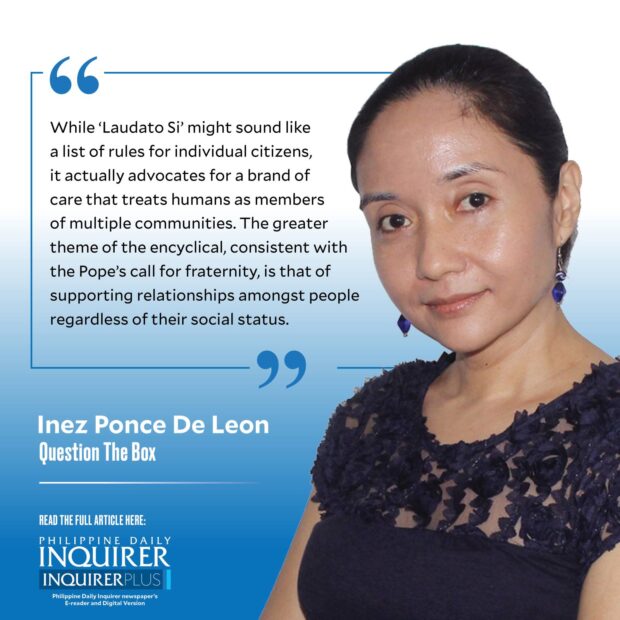Working toward ‘Laudato Si’’

You might have heard about the “Laudato Si’” schools. These schools are working toward sustainability based on the 2015 encyclical (open letter) by Pope Francis, himself an advocate for the environment. The encyclical elaborates on the damage that humans inflict on the planet and calls upon us all to change our lifestyles and consumption patterns to help the earth, our common home.Such measures we might take, as individuals, include avoiding using materials that might end up clogging waterways or adding to landfills after only one use; reducing consumption of food and utilities to the bare minimum that we immediately need; using public transport or car-pooling; and reusing or repurposing materials.
A “Laudato Si’” school aims to meet specific calls at the institutional level. These calls might include transitioning to clean energy, utilizing water responsibly, managing solid waste, greening campus spaces, and organizing advocacy campaigns for the environment.
Some universities around the world are starting to adopt these practices so that they can eventually gain the status of “Laudato Si’” institutions. In the Philippines, the De La Salle University and the University of Santo Tomas join the Ateneo in working toward “Laudato Si’” goals.
Article continues after this advertisementFor Jesuit universities, in particular, working toward “Laudato Si’” means addressing seven main areas: responding to the cry of the poor; responding to the cry of the Earth; fostering ecological economies; adopting sustainable lifestyles; providing ecological education; offering knowledge and guidance in ecological spirituality; and aiding local community resilience and empowerment.
There are several landmark actions that Jesuit universities can take under this framework. For instance, the Ateneo is exploring changing work schedules to save energy, phasing out the use of single-use plastics, and shifting to fully digital transactions.
Also on the to-do list: reducing the use of fossil fuels, promoting local biodiversity by planting native trees, divesting from activities that are harmful to the planet while investing in renewable energy initiatives, and reducing dependence on cars.
Article continues after this advertisementThis stress on addressing a car-centric culture is mentioned in the encyclical: “The quality of life in cities has much to do with systems of transport, which are often a source of much suffering for those who use them. Many cars, used by one or more people, circulate in cities, causing traffic congestion, raising the level of pollution, and consuming enormous quantities of nonrenewable energy. This makes it necessary to build more roads and parking areas which spoil the urban landscape.”
While “Laudato Si’” might sound like a list of rules for individual citizens, it actually advocates for a brand of care that treats humans as members of multiple communities. The greater theme of the encyclical, consistent with the Pope’s call for fraternity, is that of supporting relationships amongst people regardless of their social status.
In particular, Pope Francis says, “Disregard for the duty to cultivate and maintain a proper relationship with my neighbor, for whose care and custody I am responsible, ruins my relationship with my own self, with others, with God, and with the earth. When all these relationships are neglected, when justice no longer dwells in the land, the Bible tells us that life itself is endangered.”
What the encyclical calls for is not merely individual action for worldwide problems, but sitting with the marginalized, because it is they who suffer the most in the damage to our planet. It is they who have to live in areas vulnerable to the ravages of a changing climate, who have to work at the forefront of food production while contending with water shortages and low soil fertility, who stand to lose their lands and livelihood and have no alternatives to survive.
“Laudato Si’” carries with it the notion that people must come together to create solutions to environmental problems. This brand of consultation means that all stakeholders must engage in constant negotiation, from the conception of a project to its end.
Such consultation is not to be confused with simply telling people to comply with a pre-drawn plan regardless of their concerns and contexts. It is also not about putting labels on people and arguing in absolutes when consultations fall apart, and when it becomes apparent that different stakeholders also have different ideas and understandings of how to best move forward.“Laudato Si’,” therefore, calls for genuine dialogue. It is a call from which even government institutions can learn how to conduct research and run programs to uplift communities.
All members of a community must come together to formulate programs to fix our environment; but if any problems arise in the process, then there must be sincere conversations amongst all parties, an openness to varying opinions, and a willingness to compromise without losing both the goals of caring for our common home while caring for each other.
—————-
iponcedeleon@ateneo.edu
















